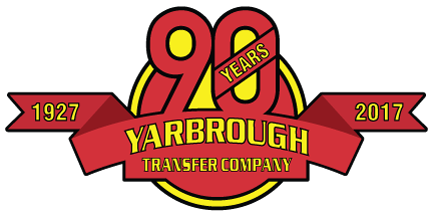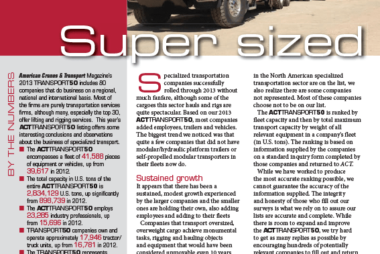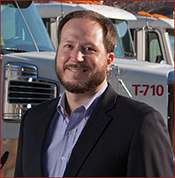Up close: David Yarbrough, President of Yarbrough Transfer Co. in Winston-Salem
David Yarbrough grew up working at Winston-Salem-based Yarbrough Transfer Co., a company founded by his great-grandfather in 1927. But he never had any interest in working at the heavy haul trucking company. “I knew from a young age that I wanted to be a lawyer,” said Yarbrough, who went on to graduate from law school, clerk for two federal judges and work as a bankruptcy lawyer. But he changed his mind in 2007, the year he joined Yarbrough Transfer Co. as executive vice president. Under his leadership, the company focused on recruiting talent, developing an information technology plan and positioning itself for growth during the economic downturn. Yarbrough Transfer Co. continues to focus its core business on moving freight that originates or has a destination point in the Southeast, but the business’ footprint can span as far as Texas, South Dakota, Utah, Arizona and Colorado.
What do you remember about growing up as a child around the business? I’d come into the office on Saturdays and days that I had off from school and sort of hang around when I was younger. As I got older, probably 12 or 13 years old, I worked here every summer. I worked in the shop. Once I got old enough to drive, I ran parts for the shop. I changed tires and brakes and did some basic kinds of maintenance stuff. Then as I got older and got into college, I worked in the dispatch office there in the summers and that was really where I sort of got my feet wet in the actual business.
Why weren’t you interested in working for the business at first? I wanted to do something different. I felt like I was well-suited to be a lawyer: I’m intellectually curious and I like to reason out arguments.
What made you decide to get into business? I enjoyed the business aspect. I enjoyed helping my clients with deals. At some point I came to the realization that I like being a lawyer, but what I’m really interested in is business. I’m really interested in how business is run, how they work, what it takes to make them successful. I said, ‘What business am I going to go in to?’ I was serving on the board here; I was outside counsel. The company was a client. At some point I just realized I have a perfectly good business that I know inside and out that has my name on it and there’s no successor.
How was the transition? It was scary because I sort of had to leave my comfort zone. I didn’t know how people were going to respond to me coming in, you know a fancy pants lawyer coming in to run sort of a blue-collar trucking company.
How do you run the business? My dad and I run the business as partners. He is very good with trucking operations and maintenance, maybe not as good in business administration. I’m strong in business administration and maybe not as strong in operations. We both work very hard to be strong in both areas, but it works out great because I took over all the things that he didn’t so much like — business administration, finance, accounting, HR, IT. He took over strictly the maintenance and operations side of things and we both do sales.
What were the first things you did when joining in 2007? One of the first things I did was assess all the people we had working here and sort of see what kind of talent level we had and what kind of professionalism level we had. We made some personnel changes, and it was a good time to do those because over the next few years we had the economic downturn. There were a lot of people available in the job market that maybe otherwise wouldn’t be available. One of the other key things I did was basically go through all of our vendor relationships and determine where it would be appropriate to renegotiate, assess maybe a different vendor, improve our expense ratios.
How did you assess IT needs? When I came here in 2007, we didn’t even have a server. After I had been here for six months to a year, I sat down and made an IT plan for the next five years, and we’ve been able to implement that. That was expensive and time-consuming, but it’s been worth it because we’ve seen really good returns on our investment in terms of efficiencies it has created. We’ve been able to provide our customers with better service, better information about where their loads are, what the status is. We’ve been able to track our documents better.
How did those things position the company for growth? From a personnel perspective, it allowed us to be more efficient. One of my big focuses is on professionalism and professional development. We targeted people who are career-oriented.
How has the business changed? Traditionally more than 90 percent of our freight moved was heavy equipment. During the last five years we’ve transitioned into what I would call industrial machinery. It’s now probably 80 percent heavy equipment and 20 percent industrial machinery: storage tanks, concrete beams, transformers, things that aren’t heavy equipment.
Do you expect industrial machinery to become a larger part of the market share moving forward? Yes, I do. We’re going to continue to focus on that segment. These pieces of machinery are very expensive and very specialized. We’ve developed an expertise in transporting high-value cargo. We’ve got the insurance in place. We’ve developed equipment that is centered around moving that stuff.
How are safety regulations affecting business? Carriers are more reluctant to hire what I would call a marginal driver.
How many drivers do you have right now? Forty.
You have offered extra vacation and per diems to attract drivers. Have the incentives worked? I think they are in process. That is sort of in line with a culture change. They don’t necessarily have an immediate effect. We have started to see some benefits from those things in terms of increased applications that we’re seeing from drivers. We also have an online application now. We have beefed up our website to show driver benefits and pay. Publicizing our pay and benefits has helped us as well.
How would you describe your management style? I’m pretty focused on giving employees responsibility and freedom to do what they think is right. I try very hard to train and mentor people.
What do you like to do in your spare time? I play golf, I watch movies, I like to hang out with my family. I’m also heavily involved in the N.C. Trucking Association. I’m the immediate past chair.


